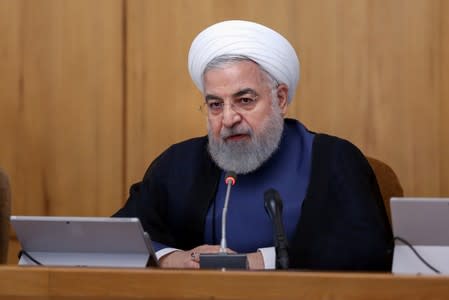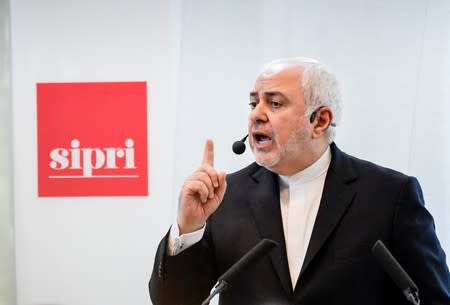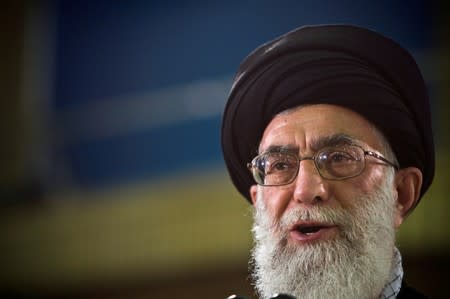Iran says top waterways won't be as safe if its oil exports cut to zero
GENEVA (Reuters) - If Iran's oil exports are cut to zero, international waterways will not have the same security as before, its president said on Wednesday, cautioning Washington against raising pressure on Tehran in an angry confrontation between the longtime foes.
The comment by President Hassan Rouhani coincided with a remark by Iranian Foreign Minister Mohammad Javad Zarif that Tehran might act "unpredictably" in response to "unpredictable" U.S. policies under President Donald Trump.
"World powers know that in the case that oil is completely sanctioned and Iran's oil exports are brought down to zero, international waterways can't have the same security as before," Rouhani said while meeting Iranian Supreme Leader Ayatollah Ali Khamenei, according to Khamenei's official website.
"So unilateral pressure against Iran can't be to their advantage and won't guarantee their security in the region and the world."
Tensions between Tehran and Washington have risen since the Trump administration last year quit an international deal to curb Iran’s nuclear ambitions and began to ratchet up sanctions. Tehran has denounced the new penalties as "economic warfare".
In a speech at the Stockholm International Peace Research Institute (SIPRI), Zarif appeared to echo Rouhani's tone.
"Mutual unpredictability will lead to chaos. President Trump cannot expect to be unpredictable and expect others to be predictable. Unpredictability will lead to mutual unpredictability and unpredictability is chaotic," Zarif said.
Global commodity trading has been rocked in recent months after a series of attacks on international merchant vessels, which the United States has blamed on Iran, and an Iranian seizure of a British oil tanker. Tehran has denied accusations that it was behind attacks on six tankers in May and June.
Washington, which has by far the strongest Western naval contingent in the Gulf, has been calling for its allies to join it in an operation to guard shipping in the Strait of Hormuz, a vital gateway for the world’s oil industry.
So far, Britain, Australia and Bahrain have joined the U.S.-led security mission to protect merchant vessels travelling through key Middle East waterways.
Reiterating Iran's chilly response to the security mission, Iranian Rear Admiral Ali Fadavi, a deputy commander of the elite Revolutionary Guards, said no one can secure the Gulf other than Iran and countries of the region, according to the semi-official Fars news agency.
"Securing the Persian Gulf is the responsibility of Iran and the countries of the region," Fadavi said. "Other than us, no one can secure the Persian Gulf."
Erik Hanell, owner of the British-flagged tanker detained by Iran while entering the Gulf, met Zarif in Stockholm on Aug. 20 to make the case for the ship and its crew to be freed.
The Stena Impero was diverted to an Iranian port on July 19, two weeks after Britain detained an Iranian tanker off the territory of Gibraltar. That ship was released this week.
"A constructive dialogue was had and we shared information around the case," Hanell, chief executive of Stena Bulk, said in a statement on Wednesday. "It was important for us to emphasise the importance of the release of the 23 crew...Also for the release of the Swedish-owned vessel Stena Impero."
(Reporting by Babak Dehghanpisheh with additional reporting by Simon Johnson in Stockholm, Tuqa Khalid in Dubai and Kate Holton in London; Editing by William Maclean/Mark Heinrich)

 Yahoo News
Yahoo News 


